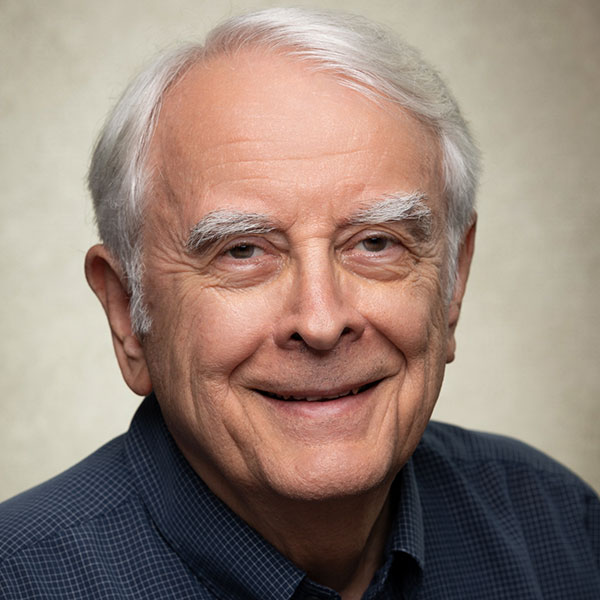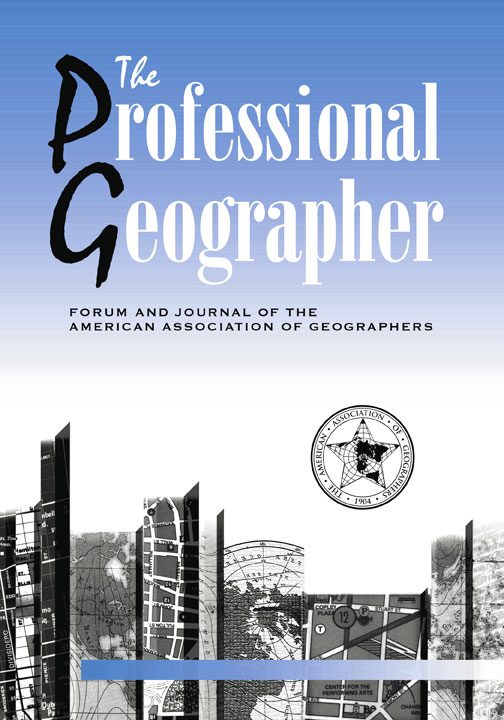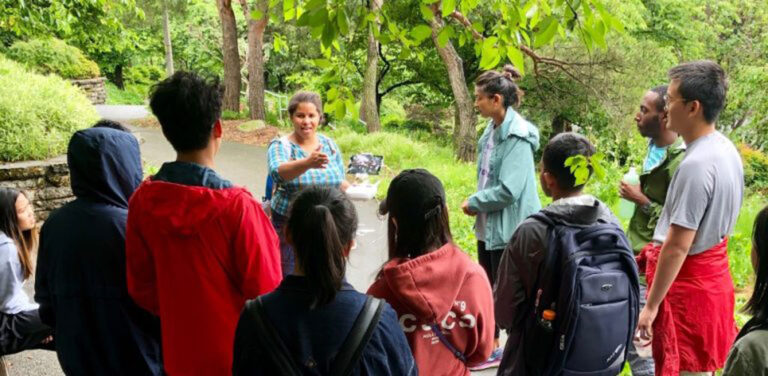AAG’s Encoding Geography Initiative Sees Successes in First Year
Launched by AAG Staff Member Coline Dony in 2018, the Encoding Geography initiative seeks to build capacity for all – for computational thinking (CT) in geography education at all levels to further strengthen our discipline. Throughout the initiative’s first year, a variety of activities and connections were established and the AAG was able to secure funding sources to support research under this initiative.
At Annual Meetings in New Orleans (2018) and Washington, DC (2019), Dony organized several workshops, inviting students, faculty, and professional geographers, in which the growing need for computational thinking (CT) skills in geography were acknowledged, and challenges in terms of teaching, learning, and applying such skills were discussed. Insights from these discussions are that learning CT skills are intimidating for both students and faculty and that there is a generational gap in teaching CT skills. Most faculty did not get or take courses involving CT while they were students, making it daunting to teach this course content unless they receive additional training and support.
The “Transformative Research” program at the National Center for Research in Geography Education (NCRGE) funded the proposed initiation of a research coordination network (RCN) around computational thinking in geography. The goal of this Encoding Geography RCN is to assess current capacity for CT in college geography by identifying courses that teach CT. This requires to first define what course content qualifies as CT in geography, which is harder than anticipated. This RCN is being extended for one more year to continue this assessment.
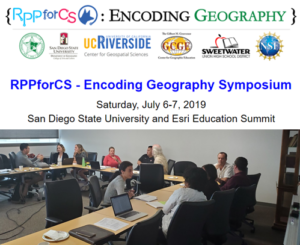 The “CSforAll” program at the NSF funded a proposed initiation of a Researcher-Practitioner Partnership (RPP) in the San Diego area. The goals of this project are manifold, but most importantly RPPs have good potential to generate better communication between K-12 geography teachers and college faculty, which could improve geography education and the pipeline to college geography, an objective recently outlined by AAG President David Kaplan. Under this grant, the first “Encoding Geography Symposium” was organized on July 6 at San Diego State University concurrently with the Esri Education Summit. This symposium brought together Geography teachers from the Sweetwater Union High School District and researchers from SDSU, UC Riverside, and Texas State University for one day to exchange the realities and challenges of teaching geography at all levels as well as assess opportunities for such a partnership across institutions of education. The outcome of the symposium were a common agenda for such a partnership, outlining the principles and objectives to build capacity for CT in geography education. The hope for this pilot RPP is to serve as a model for RPPs in other districts or states.
The “CSforAll” program at the NSF funded a proposed initiation of a Researcher-Practitioner Partnership (RPP) in the San Diego area. The goals of this project are manifold, but most importantly RPPs have good potential to generate better communication between K-12 geography teachers and college faculty, which could improve geography education and the pipeline to college geography, an objective recently outlined by AAG President David Kaplan. Under this grant, the first “Encoding Geography Symposium” was organized on July 6 at San Diego State University concurrently with the Esri Education Summit. This symposium brought together Geography teachers from the Sweetwater Union High School District and researchers from SDSU, UC Riverside, and Texas State University for one day to exchange the realities and challenges of teaching geography at all levels as well as assess opportunities for such a partnership across institutions of education. The outcome of the symposium were a common agenda for such a partnership, outlining the principles and objectives to build capacity for CT in geography education. The hope for this pilot RPP is to serve as a model for RPPs in other districts or states.
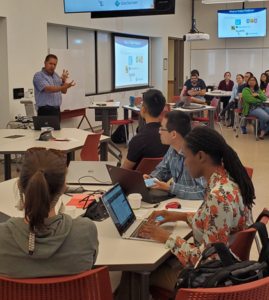 The UIUC CyberGIS Center for Advanced Digital and Spatial Studies hosted and co-organized a week-long Summer School with AAG and UCGIS in early July on Reproducible Problem Solving. This summer school brought together graduate students and early career faculty to think about reproducibility in geographic research. Many participants came without experience in programming or CyberGIS, but were mentored to bring their expertise and perspective to the table and leverage the technical ability of participants with programming or CyberGIS skills. Cross-disciplinary communication and collaboration was key to this week-long summer school.
The UIUC CyberGIS Center for Advanced Digital and Spatial Studies hosted and co-organized a week-long Summer School with AAG and UCGIS in early July on Reproducible Problem Solving. This summer school brought together graduate students and early career faculty to think about reproducibility in geographic research. Many participants came without experience in programming or CyberGIS, but were mentored to bring their expertise and perspective to the table and leverage the technical ability of participants with programming or CyberGIS skills. Cross-disciplinary communication and collaboration was key to this week-long summer school.
These activities demonstrate the early ambitions of AAG’s newest initiative, which is to open discussions about the challenges associated with teaching and learning geography today. Such conversations so far have been about the increasing demand for computational curriculum, the importance of K-12 in strengthening college geography and its diversity, and the importance of teaching and applying interdisciplinary communication. Looking forward, the AAG hopes to build on the collaborations established throughout the past year, expand our reach to additional members who wish to become involved, and support their research and efforts towards building capacity to Encode Geography.
